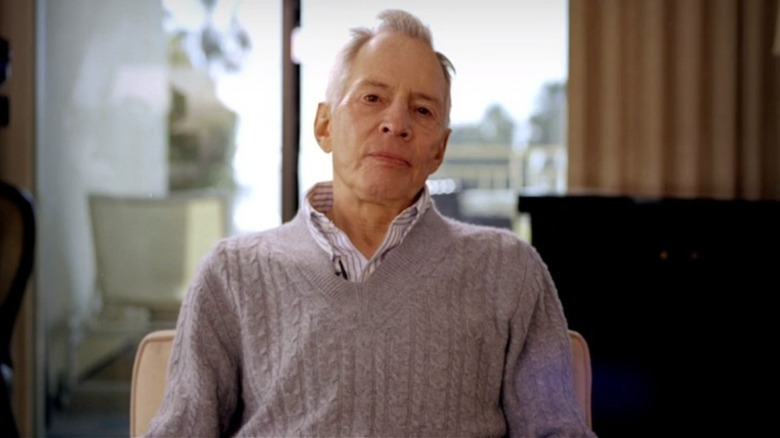
There's never been a better time to be a fan of true crime. It seems like every week, some streamer releases a buzzy new show, one algorithmically engineered to get you texting your friends, "Have you seen Episode 4!?" The genre has been around as long as people have been telling each other stories, grasping for respectability as it moved from disposable penny dreadfuls to pulp 1950s magazines like "True Detective" to critically-acclaimed reported works like "In Cold Blood" (and less-acclaimed paperbacks you might find in the racks at a drugstore), and finally to TV, film, and in the 2010s, podcasts. These days, there's more true crime content than any fan could hope to consume. Some are lurid and others artistic. Some are designed just to fill the airwaves, while others are engineered to seek justice for marginalized victims.
As fans fill their minds with graphic details of murders and molestations, though, their conceptions of "justice" may either get entrenched or upended. This is what The New Republic calls "the 'My Favorite Murder' problem;" some audiences cheer things like the death penalty as the ultimate corrective to crime while others want to tear down the system. Still, if you're a fan of the genre, this prestige true-crime wave also means the best and most thoughtful installments have never been more accessible. We've prepared a list that'll guide you through the 20 best true crime documentaries ever made, helping you sort out the good stuff from the dreck.
The Thin Blue Line (1988)
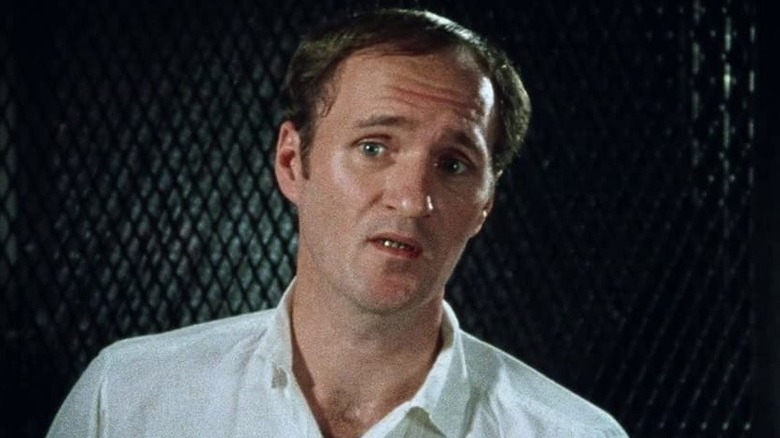
Any fan of true crime needs to watch Errol Morris' seminal documentary "The Thin Blue Line," which tells the story of a man jailed for the murder of a policeman ... a murder he may not have committed. There was true crime before it — typically on television news magazines like "20/20," usually about the investigation of crimes, occasionally unsolved ones — and there is true crime that followed. While the doc's focus on a miscarriage of justice seems like standard fodder to our modern eyes, in 1988, that was revolutionary!
One of the reasons why the film is essential viewing has to do with Morris' use of reenactments which restage the crime, or maybe just various accounts of it. There's a fascinating artistic shot of a milkshake spinning through the air, tossed by a cop in a moment of panic. It lands on the ground and spills its contents onto the concrete, revealing that it's a Burger King cup, and it looks like a strawberry shake. But minutes later, the drink is referred to by a cop's narration as a chocolate malt, and we hear that it was from Whataburger. What's more true: a cop's recollection, or a documentary recreation? What if the answer is neither? "I've never liked the idea expressed by [Jean-Luc] Godard that film is truth 24 times a second," Morris once said. "I have a slightly different version. Film is lies 24 times a second." In true crime worth your time, that concept is foundational.
The Iceman Tapes: Conversations With A Killer (1992)
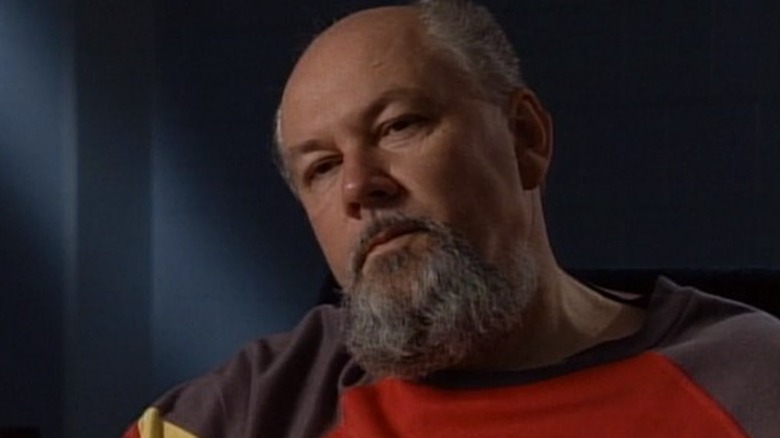
People watch true crime for a lot of reasons, including to take an unflinching look at the dark underbelly of the world in a controlled, safe way. In 1992, directors Arthur Ginsberg and Tom Spain released "The Iceman Tapes: Conversations with a Killer" as part of HBO's "America Undercover" series of documentaries. The film is about as "unflinching" as true-crime docs get. Made up of lengthy interview footage of notorious mob hitman Richard Kuklinski, the film consists mostly of the Iceman recounting his crimes in close-up, speaking in a cold, dispassionate way sure to send chills down the spine of even the most seasoned true-crime viewer. "I'd say, if I were to do somebody, I'd want at least five figures," Kuklinski deadpans, staring just off-camera, as though daring the unheard interviewers to challenge him.
Its black-and-white dramatic reenactments of Kuklinski's many murders are considerably more lurid than the artistic shots in "The Thin Blue Line," and its narration resembles a "60 Minutes" segment, but in some ways, this makes the documentary all the more disturbing to watch. Almost two decades later, Ginsberg returned to speak with the hitman once again, directing a worthwhile follow-up called "The Iceman Confesses: Secrets of a Mafia Hitman." Years after that, nearing the end of the killer's life, they teamed up for one final film, "The Iceman and the Psychiatrist." But nothing beats the original.
Paradise Lost Trilogy (1996, 2000, 2011)
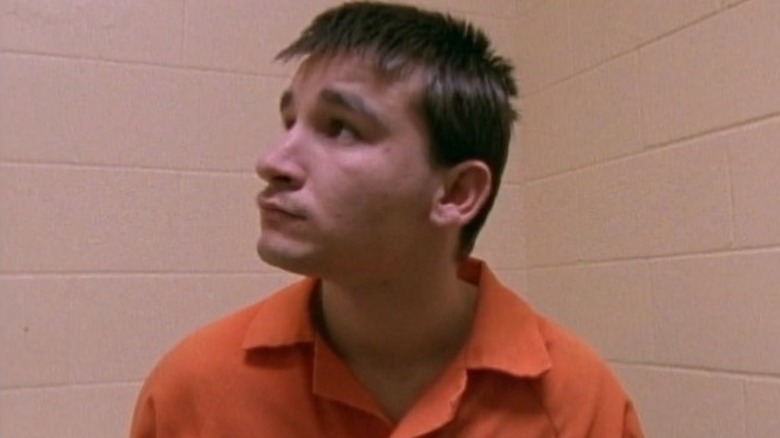
You'll find director Joe Berlinger in a number of places on this list, but up first is his seminal "Paradise Lost" trilogy, which includes the original 1996 film "Paradise Lost: The Child Murders at Robin Hood Hills," a 2000 sequel called "Paradise Lost 2: Revelations," and a film from 2011 titled "Paradise Lost 3: Purgatory," all directed in collaboration with Bruce Sinofsky. The documentaries follow the case of the so-called West Memphis Three, teenage boys who were sent to prison for the assault and killing of children in what the courts claimed were satanic rituals. As in "The Thin Blue Line," interviews with the subjects are given direct-to-camera, narrating the action in a way that is both immediate and intimate.
In a thrilling development, Berlinger and Sinofsky became part of the story themselves when they were given a bloody knife by the father of one of the accused; they of course turned it over to the cops. True crime creators being too involved with their subjects is a hallmark of the prestige true-crime genre, one that stretches back to Truman Capote's "In Cold Blood." As the trilogy continues, evidence emerges that the West Memphis Three may be innocent after all, and the series' meticulous breakdown of each twist and turn in the case forms the blueprint for so many docuseries yet to come. Fittingly, HBO Max even repackages the trilogy as a docuseries now, listing each film as an "episode" perfect for binging.
The Staircase (2004)
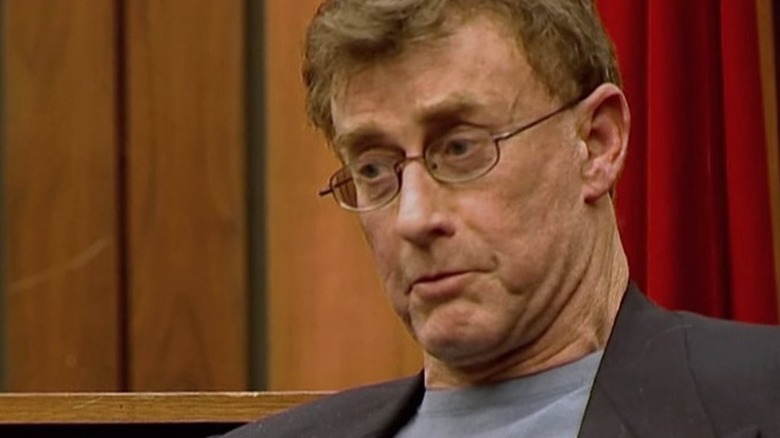
When I first became interested in true crime, the French docuseries "The Staircase" was difficult to find. The eight-episode series was about the death of an American woman named Kathleen Peterson and the trial of her husband Michael, a novelist who stood accused of her murder. ABC News aired a shortened, two-hour version of the story in 2004, and the series later aired on the Sundance Channel in 2005, and then became hard to watch. I believe I originally saw it on YouTube, in low-quality TV rips that were quickly taken down; nonetheless, I found myself gripped by what a twisted, convoluted tale it was. Director Jean-Xavier de Lestrade was given an incredible amount of access to Peterson and his family, leading to many moments that'll make you lean forward in your seat, desperate to read the eccentric Peterson's expression to see whether he's telling the truth — or whether he's a cold-blooded killer.
Nowadays, of course, on the other side of a Netflix revival and a star-studded HBO miniseries that lightly fictionalized the incident, "The Staircase" stands as an influential, widely-accessible work of true crime. Though the new episodes produced for Netflix drag the story out perhaps longer than it needs to be, the series is yet another fascinating account of a documentarian returning to his subject to examine what has changed and what's remained consistent, putting it in the lineage of the "Iceman" series and the "Paradise Lost" trilogy as much as it as a precursor to, say, "Tiger King: Season 2."
The Imposter (2012)
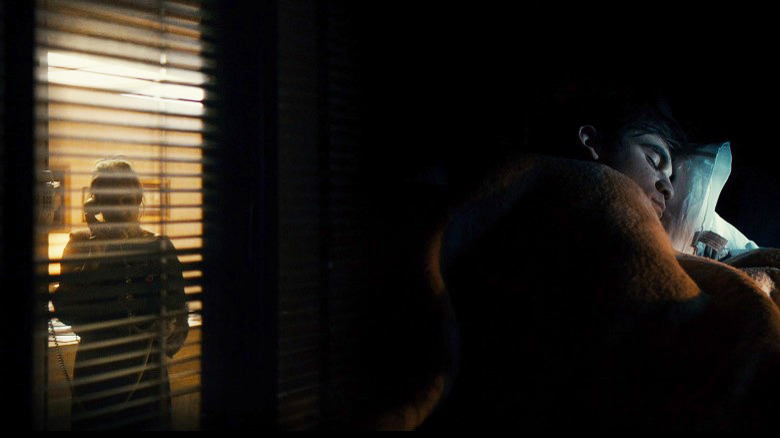
Before the true-crime dam really burst, and the streaming era began in earnest, a friend told me there was this documentary that I just had to see. He was talking about the critically-acclaimed Sundance hit "The Imposter," directed by Bart Layton, about a man who claims to be the grown-up missing child of a Texan family, even though they suspect he isn't telling the truth. After getting the DVD from Netflix, I soon realized I had never seen anything quite like it. In addition to the talking-head interviews and home-video footage, "The Imposter" also includes cinematic reenactments featuring moody, expressive lighting. Its artistic sequences work against the narrative being told in voiceover, suggesting there is something very different going on. It's documentary-as-thriller.
"I wanted it to feel hyper-real or dream-like, to not say that this is exactly what happened, but that instead, you're spending time in their memories," Layton told IndieWire. At the time, I didn't know documentaries could do that (earlier titles on this list were viewed later), and "The Imposter" is almost single-handedly responsible for my interest in the genre as a whole. Even though later "prestige true crime" films pushed this harder, and many docuseries expanded on it in different ways, "The Imposter" still stands out as a wild story, told very well.
The Act Of Killing (2012)
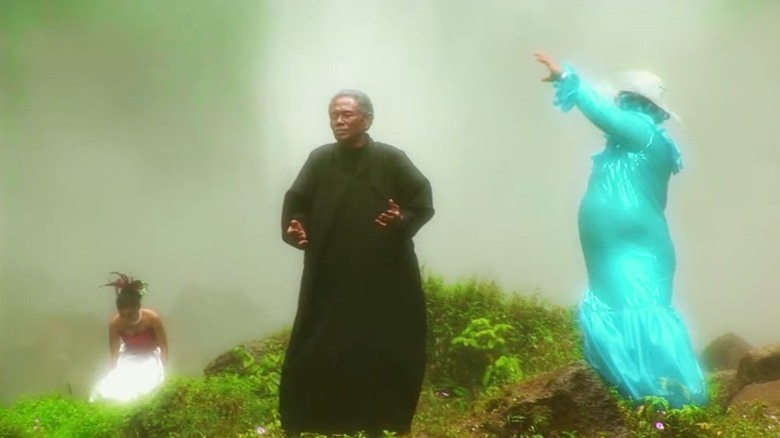
In 2012, Joshua Oppenheimer's "The Act of Killing" took the film world by storm. The Oscar-nominated doc uses the very concept of the true-crime dramatic reenactment as its central conceit — except, in this case, Oppenheimer has the killers themselves reenact what they did. It's astounding to witness, as you might imagine. The film focuses on the mass slaughter that took place in Indonesia in the 1960s, and Oppenheimer turns his camera on the men who led the death squads, asking them to recreate their memories however they wish. Some of them choose straightforward, horrific restagings, others craft cheesy action sequences, and one even reinterprets his recollections as a musical number. It's an incisive, searing investigation into the crimes themselves — often forgotten by the world — but it's also a powerful statement on cinema as memory.
When the film won Best Documentary at the BAFTA Awards, Oppenheimer said that the United States and the United Kingdom have "collective responsibility" for both "participating in and ignoring" what happened in Indonesia (per The Guardian). According to Filmmaker Magazine, his acceptance speech was then censored when it was posted online, which, you know, sort of proves his point. Don't make the same mistake the BAFTAs did; bear witness instead to what Oppenheimer is asking you to confront.
Citizenfour (2014)
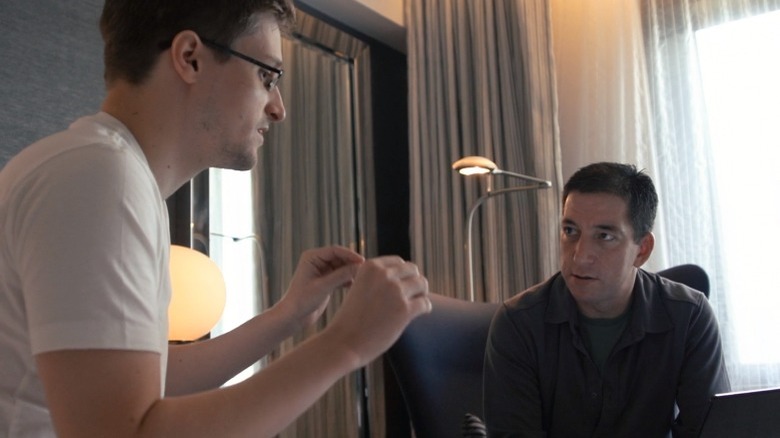
When Edward Snowden shocked the world in 2013 by leaking classified information about international spying programs, journalist and filmmaker Laura Poitras was on hand to follow him as he fled the country. True crime, after all, doesn't have to just be about murder. Fashioning her documentary into a sort of crime thriller, Poitras and her cameras are as involved in the story as documentarians can possibly be. The immediacy of Poitras' access is genuinely thrilling. As an audience, we are along for the ride as Snowden flees the watchful eye of a government that has decided he's a traitor, and we are placed in the room as he hands over explosive documents to journalist Glenn Greenwald.
The focus of "Citizenfour," in a way, inverts the typical true-crime format. Instead of following the investigation of a crime, we bear witness as it unfolds. We watch as the central figures guard themselves against the likely miscarriage of justice that is to follow, rather than trying to untangle it after the fact. The fact that "Citizenfour" exists, let alone saw wide release, is almost unbelievable; there are few scenes in documentary filmmaking as intense as the moment when a fire alarm rings at the Hong Kong hotel where Snowden is holed up, and we wonder if somehow, the powers that be are stopping this very film from being made.
The Jinx (2015)
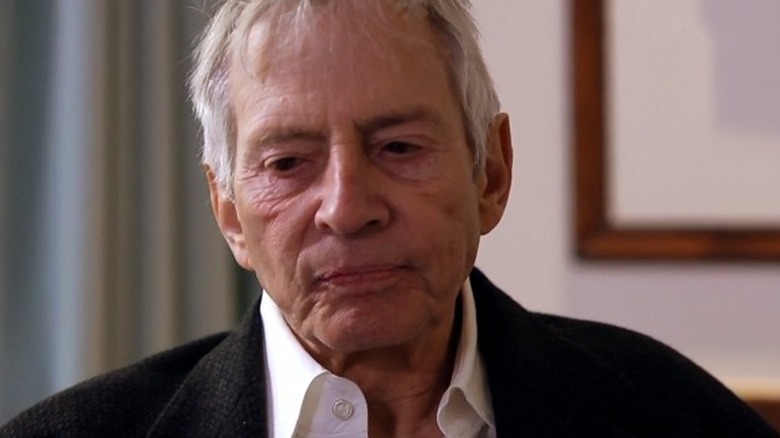
Sarah Koenig's podcast "Serial" whet audiences' appetites for, famously, "one story, told week by week." While there were some exceptions — "The Staircase," for one — true crime had typically been the purview of either documentary films or shows like "20/20," "America's Most Wanted," or "Unsolved Mysteries," which covered a crime (or often several crimes) over the course of a single episode. In early 2015, HBO began airing "The Jinx: The Life and Deaths of Robert Durst," an investigation into several disappearances connected with the wealthy real-estate developer. Each episode involved twists and cliffhangers that brought viewers back the following week, eager to see just how Durst would weasel his way out of an ever-tightening noose. "The Jinx" also featured artistic reenactments of events, closer to Errol Morris than to the blue-hued trashiness of late-night true-crime.
At this point, you likely know that the series ends with a climactic admission from Durst. It's a moment that had me leaping off my couch in utter shock, yelling at my television as I've never yelled at my television before. It also dragged filmmakers Andrew Jarecki and Marc Smerling into the story, sparking a meta-conversation about the ethics of true crime; after all, they might've sat on important evidence so as not to spoil the finale of their TV show. Controversy erupted, Durst was arrested, and "The Jinx" went down in true-crime history. Even knowing all of that, the series is well worth a watch to see just how the filmmakers pulled it off.
Making A Murderer (2015)

Late in 2015, Netflix entered the true-crime game with "Making a Murderer," directed by Moira Demos and Laura Ricciardi. The docuseries follows a man named Steven Avery, released from prison after being exonerated by new DNA evidence. He then either committed a different murder or was framed for one by angry cops. The series is as twisty and turny as viewers could hope for, each episode ending with a shocking cliffhanger that ensures bingeability. Planted evidence, a surprise confession, corrupt lawyers ... "Making a Murderer" has it all.
It also cemented the emergent "prestige true crime" wave as being about the miscarriage of justice. Like "Serial," this series leads the audience toward a conclusion that, guilty or not, something is deeply wrong with our justice systems. We place too much trust in our institutions, and often, they fail us, sometimes working directly against us. Though the first season took 10 years to film, with the directors getting an incredible amount of access to the case as it unfolded, they returned a few years later with a somewhat less-influential follow-up season. The second season addresses accusations that the filmmakers got too close to their subject — which will sound familiar at this point in the list — and that the show excluded certain evidence that made Avery look guilty. The follow-up also exemplifies another trend: the genre considering its own success, which was skewered brilliantly by "American Vandal."
O.J.: Made In America (2016)
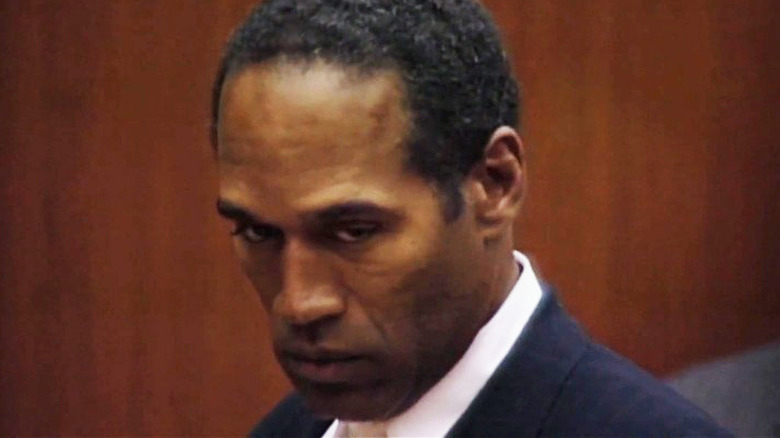
Born in 1990, I knew the basics of the O.J. Simpson trial by the time I watched ESPN's kaleidoscopic doc "O.J.: Made in America," but I found it extremely informative. It's nearly eight hours long, but let's not get into the debate about whether it's a film or a TV show (though it did win the Oscar for Best Documentary Feature). It uses every minute to cover the deluge of contemporary news footage and analysis moving from the broader social context — the Rodney King riots, O.J.'s career as a football star and film actor — to the murder of Nicole Brown Simpson and Ron Goldman, and finally the trial and its aftermath.
It's a thorough depiction that doesn't shy away from the gruesome specifics of the crime. Viewers should be aware that "O.J.: Made in America" includes graphic photos of Nicole Brown Simpson's body, driving home what felt in the news like abstract descriptions of what was done to her. It's sickening to see, but it has its place; the film's project is to include every detail, as hard as it may be to watch.
Tower (2016)

As audiences' desires for more true crime content grew, filmmakers began to experiment with the form. "Tower," directed by Keith Maitland, is a film that reconstructs almost minute-by-minute the tragic 1966 shooting at the University of Texas in Austin. A sniper shot and killed numerous people over a 96-minute period from the upper observation deck of the campus' Main Tower; at the time, it was the deadliest school shooting in American history. "Tower" isn't a typical true-crime documentary. Instead of merely reconstructing the story through interviews and contemporaneous footage, Maitland's film animates over both of the above, rotoscoping the unfolding crime rather than merely reenacting it. The unimaginable length of the slaughter meant that numerous news cameras made it to campus while the shooting was ongoing. We see some of that footage, and then animated close-ups show us what victims and survivors may have been experiencing at that moment.
It has an eerie effect, paradoxically making the film feel more immediate and also keeping us at a remove. "The film is based on 50-year-old memories, and the animation has a dream-like quality that honors the idea of memory," Maitland told Filmmaker Magazine. This feels like it puts the animated approach in line with Errol Morris' use of artistic, malleable reenactments in "The Thin Blue Line," suggesting that documentary is memory is truth is invention. It's a thought-provoking, uncomfortable watch that should be on the radar of any true-crime fan.
The Keepers (2017)
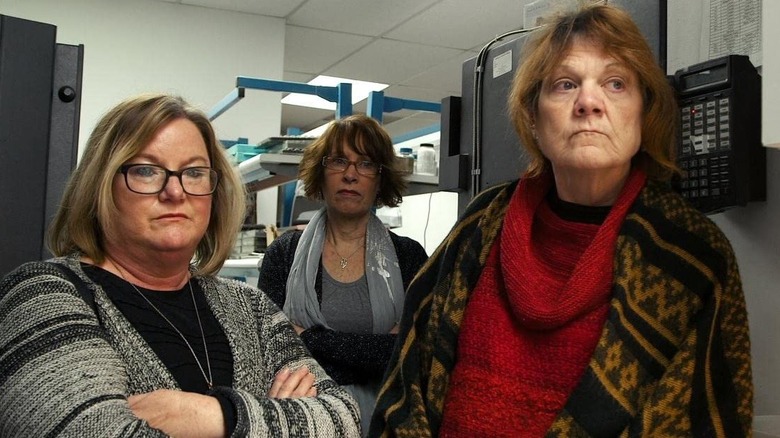
A few years into the prestige true-crime wave, filmmaker Ryan White released "The Keepers" on Netflix, telling the story of the unsolved murder of a young nun from Baltimore. The series suggests that Sister Cathy Cesnik might have been killed to cover up rampant sexual abuse in the Catholic church, specifically at the high school where she taught. As was becoming standard for the format, each episode ends with a cliffhanger that ensures viewers will keep clicking that "Next Episode" button. It's a tragic story without a clear resolution, and haunting how little was done to get justice for Sister Cathy.
The following year, Netflix released "Evil Genius," a decently well-made series about the infamous Pizza Bomber case. Unlike that show, which features a narrator who, at the end of Episode 2, "got up off [his] couch and drove" into the story — throwing its portrayal of its central criminal off-kilter, if you ask me — "The Keepers" keeps its documentarian's personal connection to the case close to the chest. A lot of the story's explosive testimony comes from a woman known only as Jane Doe; the woman is actually a friend of White's aunt, and White's aunt was, in fact, a student of Sister Cathy. That may have been White's way in, but unlike a lot of prestige true crime, the series isn't about that, and it's stronger for it.
If you or someone you know may be the victim of child abuse, please contact the Childhelp National Child Abuse Hotline at 1-800-4-A-Child (1-800-422-4453) or contact their live chat services.
Strong Island (Dir. Yance Ford, 2017)
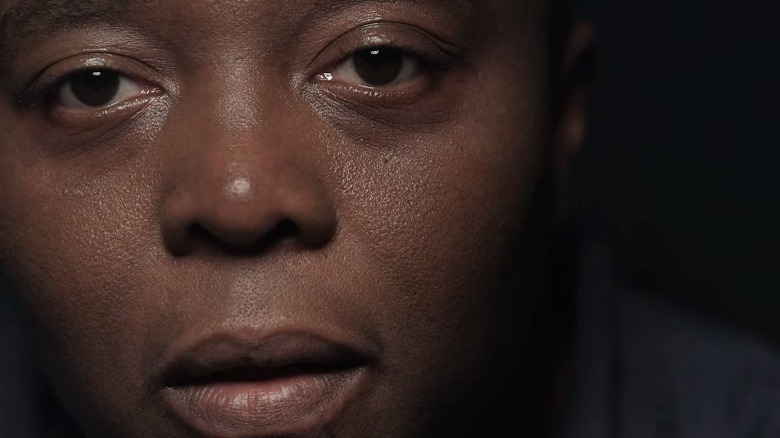
A common criticism of true crime is that it focuses on killers and criminals rather than honoring victims, and that's certainly true of a lot of works in the genre. That cannot be said, however, of "Strong Island," Yance Ford's devastating, Oscar-nominated documentary about his brother's murder at the hands of a white man who was never charged with the crime. This positions "Strong Island" as the epitome of the decades-long true crime trend of documentarians getting involved in the stories they are telling; here, finally, the camera is turned on the filmmaker himself. Ford narrates in uncomfortable close-up, detailing his harrowing journey of grief as well as his own investigation into what happened to his brother — the result of (say it with me) a miscarriage of justice. It's not only that, but it's a miscarriage of justice due to blatant racism.
That raw on-screen grief is what makes "Strong Island" such a necessary watch for fans of the genre who don't want to shy away from its more difficult implications. The film contains a moment where Ford gets a particularly difficult detail confirmed after decades of speculation. He puts his head in his hands and howls, his microphone cutting out, as though the film itself is unable to contain his pain. It's a gut-punch of a moment in a shattering documentary, one that exemplifies the genre's ability to convey something about the human condition like few other forms of art.
If you or a loved one has experienced a hate crime, contact the VictimConnect Hotline by phone at 1-855-4-VICTIM or by chat for more information or assistance in locating services to help. If you or a loved one are in immediate danger, call 911.
Roll Red Roll (2018)

Another trend that emerged in the mid-2010s was the social media true-crime doc. Think that episode of "American Vandal" that attempted to piece together a comprehensive timeline of the infamous party from hundreds of Snapchat videos, Instagrams, tweets, etc., and you've got a pretty good idea of "Roll Red Roll," Nancy Schwartzman's searing indictment of the Steubenville rape case and resulting frenzy of slut-shaming that occurred in 2012. The film also exemplifies another growing trend: the true-crime fanatic who becomes part of her own case. Here, it's blogger Alexandria Goddard, the writer who broke the case wide open online by digging into the social media accounts of the students involved in the rape. Her writing drew ire from the community, who wanted to protect the perpetrators.
Unlike later installments in the social-media subgenre (such as "Don't F**k with Cats"), "Roll Red Roll" is admirably restrained, allowing its subjects' own writing to speak for itself. Schwartzman's camera, too, lingers on the people she interviews, letting victim-blaming statements like, "When you put yourself in that position, you have to take some responsibility for your actions," hang uncomfortably in the air. The film's use of football play-style X's and O's to map out the actions of its central players is a chilling grace note on top of an incisive look at both a moment and its context, earning "Roll Red Roll" a well-deserved place on this list.
If you or anyone you know has been a victim of sexual assault, help is available. Visit the Rape, Abuse & Incest National Network website or contact RAINN's National Helpline at 1-800-656-HOPE (4673).
Conversations With A Killer: The Ted Bundy Tapes (2019)
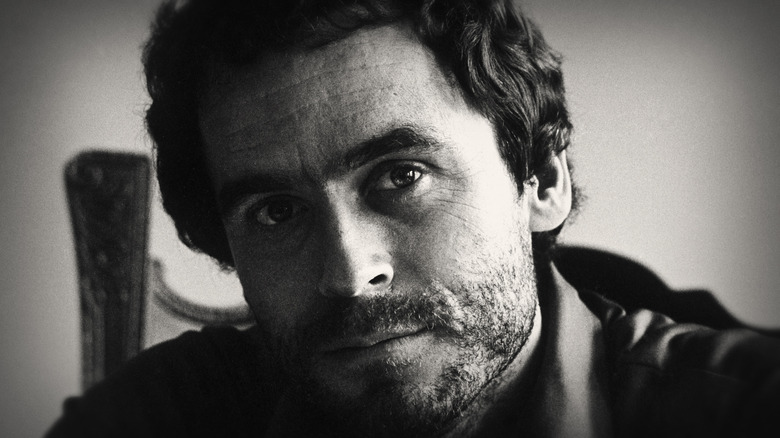
Joe Berlinger is back on the list, this time with a Netflix series about one of the best-known serial killers of all time: Ted Bundy. Bundy left behind a trove of interview tapes just before he was executed, tapes in which he finally admitted what he'd been denying: of course he was the one who killed all those people. The title here plays on "The Iceman Tapes," which let the hitman's words do all the talking. Like that film, this series' use of audio is downright chilling. Still, Berlinger's docuseries plays with the format, toying with what our expectations are of a Netflix true-crime series. That is, we naturally expect now that we are watching a miscarriage of justice.
Berlinger works hard to establish the social context of Bundy's killing spree, and he makes sure to let us see once more why people found Bundy so charismatic. (He also directed "Extremely Wicked, Shockingly Evil and Vile" that same year, a fictionalized telling of the same story, which saw Zac Efron put his all-American star image to use in making Bundy's charisma visible again). Like Ann Rule's career-making book "The Stranger Beside Me," which details her friendship with the killer, this docuseries is constructed like a story about a wrongly-accused man, someone entrapped by police — until it slaps you in the face with the realization that, oh yeah, this is Ted Bundy ... of course he f---ing did it.
Surviving R. Kelly (2019)
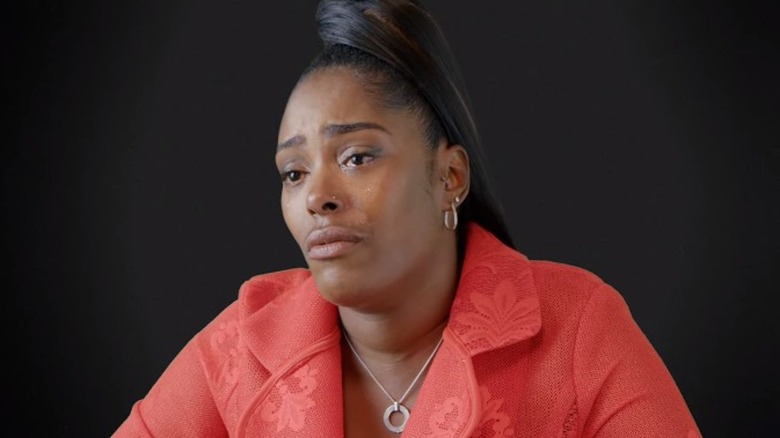
Plenty of documentaries on this list have specific points of view, clearly angling for some kind of result. Randall Adams was released from prison after "The Thin Blue Line," while "Making a Murderer" clearly thinks Brendan Dassey was in no state of mind to give a confession. The documentary on this list that most clearly serves as activism, however, is "Surviving R. Kelly," produced by filmmaker Dream Hampton, which attempted to shine a spotlight on the open secret of R&B singer R. Kelly's many sex crimes. When it was released on Lifetime in 2019, it prompted a cultural reckoning. Collaborators like Lady Gaga disavowed the singer, and the renewed attention ultimately led to Kelly being sentenced to 30 years in prison (via CNN).
Aside from its broader cultural implications, it's also just a solid piece of filmmaking. Intertitles show denials from Kelly's lawyers in stark white text on black backgrounds, contrasted with intimately-lit, emotional talking heads from his victims, survivors, and commentators. A powerful collage of sources as varied as news broadcasts and "South Park" clips proves that everyone knew what was going on, but no one did anything about it. It's a damning watch. Like many docuseries have, "Surviving R. Kelly" returned for a second season that attempted to sift through the aftermath of its own release. The title of the second season finale points proudly to the doc's function as advocacy, also serving as a statement of purpose: "Bring Our Girls Home."
If you or anyone you know has been a victim of sexual assault, help is available. Visit the Rape, Abuse & Incest National Network website or contact RAINN's National Helpline at 1-800-656-HOPE (4673).
I'll Be Gone In The Dark (2020)
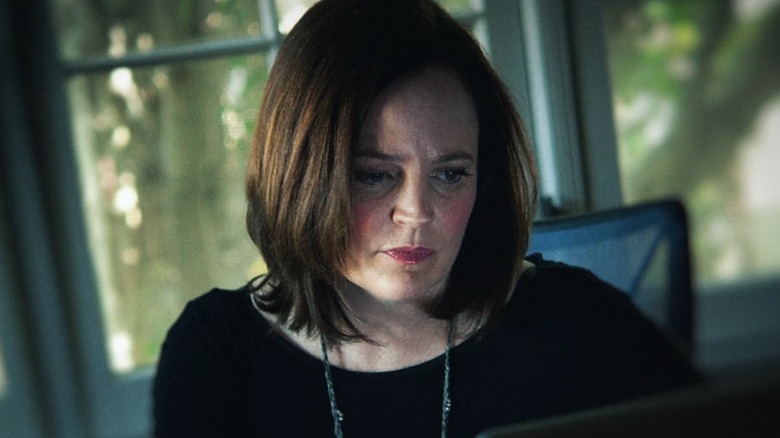
This list has highlighted several true crime documentaries that are in some way about their own creation as much as they are about the crime itself. The best of this subgenre is, without a doubt, HBO's "I'll Be Gone in the Dark," based on Michelle McNamara's stunning book of the same name and narrated in her words by Amy Ryan. The series follows McNamara's obsession with the case of the Golden State Killer (aka the East Area Rapist, aka the Original Night Stalker, aka EAR/ONS). It documents her unquenchable belief that the crime was solvable as much as it relays the specific details of what the killer did. What emerges are dueling portraits: one of a frightening specter who haunted the shadows of the Californian nighttime in the '70s and '80s, and the other a fiercely-empathetic woman who thought it a moral outrage that he hadn't been caught.
"'You'll be silent forever and I'll be gone in the dark,' you threatened a victim once," McNamara wrote to the killer, who had then escaped justice for decades. "Open the door. Show us your face. Walk into the light." McNamara, unfortunately, passed away before her words came to fruition, but EAR/ONS was caught shortly after the book's publication (via Yahoo!). This meant the docuseries could go further than its source material, simultaneously cementing McNamara's legacy as an intrepid reporter and making itself the definitive document of one of the country's most chilling serial killers.
If you or anyone you know has been a victim of sexual assault, help is available. Visit the Rape, Abuse & Incest National Network website or contact RAINN's National Helpline at 1-800-656-HOPE (4673).
Murder On Middle Beach (2020)
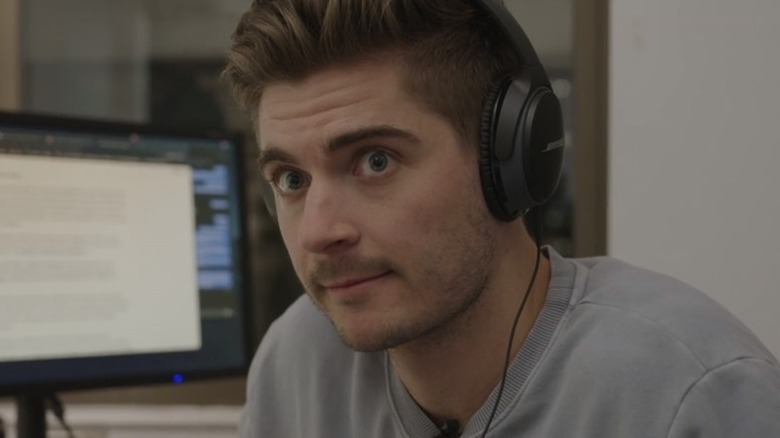
HBO's tragic docuseries "Murder on Middle Beach" is about the unsolved killing of Barbara Hamburg, found murdered outside her Connecticut home in 2010. A decade of questions about the incident led her son, Madison Hamburg, to craft this intimate documentary about what happened and how he's gone on. As a result, a number of growing trends in the genre culminate in one emotional series. Like many other prestige true-crime installments on this list, "Murder on Middle Beach" is not just about the case, but is about a true-crime filmmaker's investigation, and about the way the genre can be used to work through personal pain. It also focuses on the victims and survivors of the crime; by necessity, with no killer arrested, all that's left is for Hamburg to excavate his own family trauma.
Hamburg's dedication to following every lead puts the spotlight on some members of his own family, and the series is genuinely thrilling as the young man tries to figure out which of his relatives might have been involved in his mom's death. The talking-head interviews are intimate and emotional; after all, these are family members speaking kindly to their nephew, brother, or son. It's intensely sad, immensely respectful, and extremely impressive for a young filmmaker, ultimately a portrait of a man coming into his own as he learns to live in the aftermath of the sort of crime most true-crime fans only experience as audience members.
Assassins (2020)
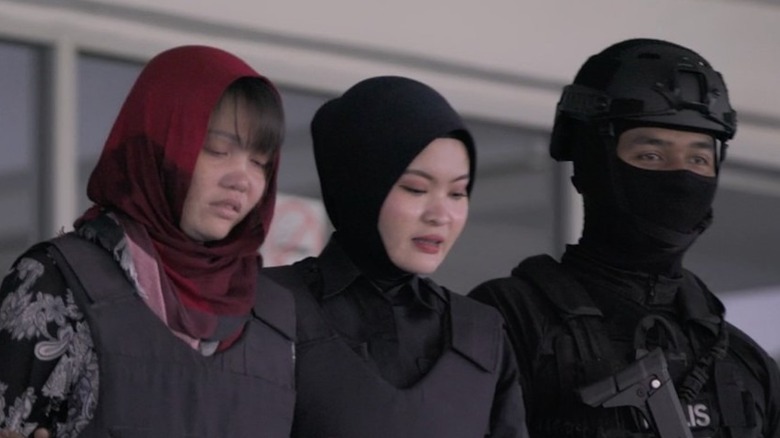
In early 2017, the biggest story in America was the inauguration of Donald Trump as the 45th President, causing immediate chaos as we began debating the concept of "alternative facts" mere days into his term. A few weeks after Kellyanne Conway first used that phrase, a curious news story broke: North Korean dictator Kim Jong-Un's brother, Kim Jong-Nam, had been assassinated by a woman wearing a shirt that said "LOL." Several years later, documentarian Ryan White released "Assassins," a true-crime film that sifts through several levels of its own "alternative facts."
The two women jailed for the crime, Siti Aisyah and Doan Thi Huong, proclaimed their innocence. Moreover, they insisted they had been tricked into killing the brother of one of the most brutal men in the world, believing that when they smeared a poisonous cream on the man's face, they were merely filming a silly internet prank video. White's film follows their arrest, trial, and imprisonment, examining both their backgrounds and security footage from many angles for clues that they might just be telling the truth. Unlike many entries on this list, the justice system under the microscope is not one the filmmaker grew up under. Western staples of "justice" — the concept of juries, for example — butt up against the court system in Malaysia, which can feel like injustice. It's a fascinating tension, making the film well worth a watch.
Crime Scene: The Vanishing At The Cecil Hotel (2021)
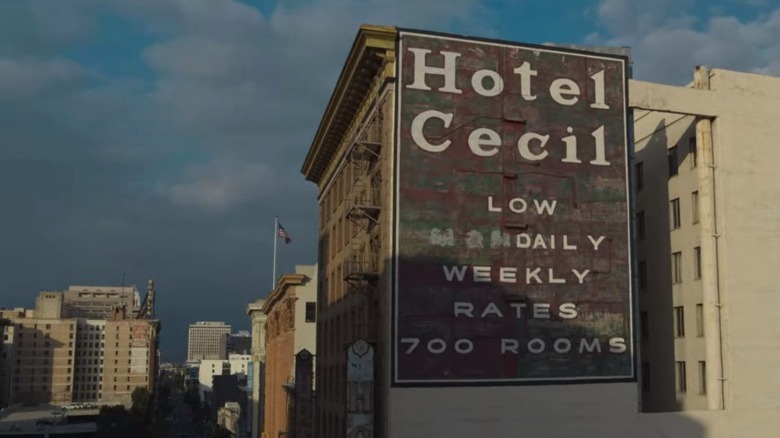
Joe Berlinger's "Crime Scene: The Vanishing at the Cecil Hotel" didn't get great reviews. The Rotten Tomatoes summary, for example, calls it "a sad story, poorly told." Let's be honest, there is no crime here in the traditional sense (although the Netflix series is damning in its depiction of a broader societal failure: Skid Row). What happened to Elisa Lam, though — that erratic elevator video, the death in the water tower on the roof — was a tragic accident, and it can feel exploitative to go over the incident in excruciating detail, poring over every rumor and online conspiracy theory.
But this is Joe Berlinger we're talking about, the man who made the "Paradise Lost" trilogy. He understands the genre he's working with inside and out, and in its final episodes, this docuseries turns itself inside out, too. It becomes about true-crime obsession gone bad, about keyboard "investigators" whose general sense that "something doesn't feel right" does more harm than good. It's not (just) an exploitative retelling of the death of a woman who was likely experiencing a mental health crisis; it's about how exploitative all of these stories are, turning tragedy into consumable content. "Don't F**k with Cats" worked at something similar, pummeling viewers with a direct-to-camera accusation in its final moments. "The Vanishing at the Cecil Hotel" is more subtle, and fans of true crime should reckon with it.
Read this next: The 50 Best Documentaries You Can Watch On Netflix Right Now (July 2022)
The post The 20 Best True Crime Documentaries Ever Made appeared first on /Film.
